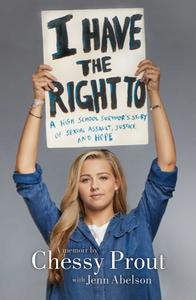
|
|
| photo: Heather Donlan | |
Chessy Prout was raised in Japan and attended boarding school in New Hampshire. At St. Paul's, as a freshman, Chessy was the victim of a sexual assault as part of a ritual competition at the school called "Senior Salute." The case and the trial garnered national and international media attention. Two years later, she decided to step forward publicly. In August 2016, Chessy launched the #IHaveTheRightTo initiative with the organization PAVE, for which she is an ambassador. Her book, I Have the Right To: A High School Survivor's Story of Sexual Assault, Justice and Hope, written with journalist Jenn Abelson and published by Margaret K. McElderry Books, is now available.
To begin with the most obvious question, why did you want to write a book?
The response I received from sharing my story and shedding my anonymity on the Today Show was overwhelming. So many survivors came forward with their own experiences and how they identified with my journey. There is power in our unity and honesty. If my story, as raw and difficult as it is to share, helps even one person, it'll have been worth it.
I Have the Right To is approachable for younger readers. Did you set out to create a work that could be appreciated by both middle grade and young adult readers?
I was 15 when I was sexually assaulted, so I wanted to channel my voice from that time, reminding people that the experiences and opinions of kids are important and deserve to be heard. Also, so much attention is focused on preventing sexual assault in college, but not enough on the abuse that happens to even younger people. Kids need to learn about consent and what is and isn't acceptable much earlier than they do today.
What was the process of co-writing with Jenn Abelson like?
Jenn and I connected while she was working on an investigation into sexual abuse at private schools for the Boston Globe Spotlight Team. We got to know each other over several months as I made my transition from an anonymous Jane Doe to a public advocate. The summer after my senior year of high school, Jenn and I spent hours together every day, exploring the most intimate, uncomfortable moments of my life. We dug through my journals, text messages, photos, Spotify playlists, e-mails and other records to help tell my story. We sat side by side writing at my home and in coffee shops around Naples, Fla. And when things got too heavy, we'd take breaks and search for cute puppies online. When we finished the manuscript, I bought my first puppy, JJ. One of the J's stands for Jenn! About those journals, text messages, etc. A lot of that information is very personal--why did you decide to include so many examples?
About those journals, text messages, etc. A lot of that information is very personal--why did you decide to include so many examples?
Although I didn't commit the crime, being the primary witness in a sexual assault case felt a lot like being on trial. In a room packed with strangers, for eight hours over the course of three days, I was forced to recount the most terrifying and disgusting things that had ever happened to me. But as I grew into my advocacy, I realized that I had nothing to be ashamed of. And one of the ways I began healing from my trauma was to talk about what happened. During the trial the defense attorney often misquoted me, so I wanted to make sure that the book included plenty of accurate primary documents.
The book pulls no punches when it comes to the description of your assault. Was that a purposeful move?
When people hear the word rape, they often picture a stranger jumping out of a bush and attacking someone. But statistics show these crimes are usually committed by individuals we know and trust. It felt important to depict how consensual kissing could evolve into a sexual assault--and how bodies respond to trauma in real time. In the days following my assault, I didn't know that what happened to me was against the law. I couldn't put a name to the fear and pain I felt. I also thought I was being too sensitive and blamed myself for not fighting back enough--for freezing. I blamed myself for years until I learned that freezing and dissociating is a normal physiological response to an assault. I hope that by illustrating this, people will gain a broader understanding of the importance of affirmative consent.
What has it been like to be propelled into advocacy because of this personal trauma?
During my first advocacy events, I questioned whether I belonged on the impressive panels sitting next to people who had dedicated their careers to ending sexual violence. I hadn't even graduated high school yet, and I didn't think I brought much to the table. But these experienced advocates made me feel welcome and valued. And I soon realized that young voices like mine deserve to be part of the conversation.
It can be overwhelming at times to recount my journey in front of strangers, and I draw strength from my family and fellow survivors. Since going public, I have learned to fully embrace the title of survivor, and I'm eager to help kids learn about consent and what a healthy relationship looks like.
Do you think that this book has a universal message for survivors of sexual assault?
Absolutely! While every survivor's story and experience is different, there are common themes and the first is for all of us to recognize that it isn't our fault. My book is the story of a teen girl but I believe that there are messages here for boys, parents, educators and others--the time is now to address these issues in substantive ways.
Now that your book is out in the world, what's next?
I'm looking forward to continuing my advocacy work and becoming a college student, joining Barnard's Class of '22! --Siân Gaetano, children's and YA editor

